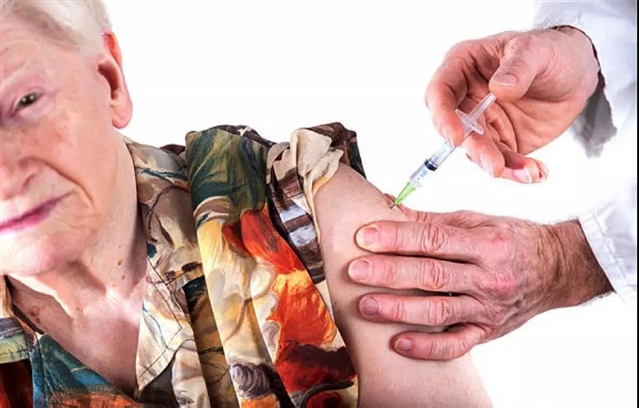|
|
|
|
|
老年人注射疫苗的现状和挑战 | Immunity & Ageing |
|
|
论文标题:Vaccines for the elderly: current use and future challenges
期刊:Immunity & Ageing
作者:Birgit Weinberger
发表时间:2018/1/22
数字识别码:10.1186/s12979-017-0107-2
原文链接:https://immunityageing.biomedcentral.com/articles/10.1186/s12979-017-0107-2?utm_source=other&utm_medium=other&utm_content=null&utm_campaign=BSCN_2_DD_Sciencenet_Article
微信链接:https://mp.weixin.qq.com/s/HznsWoV0Pg2Nuo2gi3VBdQ
随着预期寿命的不断延长,全球人口的平均年龄逐年增长,预计到2050年,60岁以上人口将翻一番,达到21亿。全球80岁以上人口的增长更为迅猛,2015年这个数字是1.25亿,预计2050年这个数字将达到4.34亿。与年轻人相比,老年人受感染的程度通常更加严重,并且传染病通常与长期慢性后遗症有关,例如日常活动能力减弱、逐步开始虚弱、失去生活自理能力等。这对公共卫生系统来说将是一个严峻挑战,因此预防传染病是确保健康衰老、改善生活质量的重要措施。大家都承认儿童疫苗接种取得了巨大成功,但却常低估终身免疫接种计划的必要性以及在老年人群中进行疫苗接种的重要性。
Birgit Weinberger等人在Immunity & Ageing期刊上发表的这篇综述总结了目前发达国家对老年人疫苗接种的建议,给出了目前老年人疫苗的免疫原性和疗效数据,并提出了开发专门针对老年人的新型疫苗的展望。

随着年岁增长,人体的免疫系统在发生变化,这导致老年人患感染性疾病的概率和严重程度明显增加。疫苗接种是预防感染的最有效措施,大多数国家的疫苗接种建议都包括了针对老年人的具体疫苗接种指南。指南通常推荐有基础疾病的老年人接种流感和肺炎链球菌疫苗,但对于老年人接种的年龄界限则不尽相同(从≥ 50岁到 ≥ 65岁不等)。一些国家还建议老年人接种带状疱疹疫苗(见下表)。

表1. 总结了目前欧洲部分国家和美国的老年人疫苗接种建议。
其中推荐给老年人的疫苗中部分是推荐给所有成年人的,如定期强化接种破伤风/白喉/百日咳/脊髓灰质炎疫苗,还有部分是推荐给特定人群的,比如适合疫区人群接种的蜱传播脑炎疫苗,或者适合旅行人群有针对性地接种的疫苗。
大多数目前使用的疫苗在老年人体内的免疫原性和有效性都比在年轻人体内低。提高免疫原性的方案包括:增加抗原剂量,更换给药途径,以及使用佐剂等。目前佐剂只应用于流感疫苗,有助于诱导更高的抗体浓度。目前流感和肺炎链球菌通用疫苗的研究正在进行中,这类通用疫苗能克服当前菌株特异性疫苗的局限性。呼吸道合胞病毒在老年人中感染率非常高。开发针对呼吸道合胞病和其他病原体如院内感染的新型疫苗对老年人的健康具有重大意义,因此许多学术和商业组织正在对此进行广泛深入的研究。鉴于目前老年人的疫苗接种覆盖率远不能让人满意,因此除了新疫苗开发之外,提高大众对非儿童期疫苗接种认知的重要性也至关重要。
摘要:
Age-related changes of the immune system contribute to increased incidence and severity of infections in the elderly. Vaccination is the most effective measure to prevent infections and vaccination recommendations in most countries include specific guidelines for the elderly. Vaccination against influenza and Streptococcus pneumoniaeis usually recommended for persons with underlying diseases and for the elderly with heterogeneous age limits between ≥ 50 years and ≥ 65 years. Some countries also recommend vaccination against herpes zoster. Several vaccines are recommended for all adults, such as regular booster shots against tetanus/diphtheria/pertussis/polio, or for specific groups, e.g. vaccination against tick-borne encephalitis in endemic areas or travel vaccines. These are also relevant for the elderly. Most currently used vaccines are less immunogenic and effective in the elderly compared to younger adults. Potential strategies to improve their immunogenicity include higher antigen dose, alternative routes of administration, and the use of adjuvants, which were all implemented for influenza vaccines, and induce moderately higher antibody concentrations. Research on universal vaccines against influenza and S. pneumoniae is ongoing in order to overcome the limitations of the current strain-specific vaccines. Respiratory syncytial virus causes significant morbidity in the elderly. Novel vaccines against this and other pathogens, for instance bacterial nosocomial infections, have tremendous potential impact on health in old age and are intensively studied by many academic and commercial organizations. In addition to novel vaccine developments, it is crucial to increase awareness for the importance of vaccination beyond the pediatric setting, as vaccination coverage is still far from optimal for the older population.
阅读论文全文请访问:
https://immunityageing.biomedcentral.com/articles/10.1186/s12979-017-0107-2?utm_source=other&utm_medium=other&utm_content=null&utm_campaign=BSCN_2_DD_Sciencenet_Article
期刊介绍:
Immunity & Ageing(https://immunityageing.biomedcentral.com/, 4.019 - 2-year Impact Factor, 3.333 - 5-year Impact Factor) is an open access, peer-reviewed, online journal that considers manuscripts on all aspects of ageing examined from an immunological point of view.
(来源:科学网)
特别声明:本文转载仅仅是出于传播信息的需要,并不意味着代表本网站观点或证实其内容的真实性;如其他媒体、网站或个人从本网站转载使用,须保留本网站注明的“来源”,并自负版权等法律责任;作者如果不希望被转载或者联系转载稿费等事宜,请与我们接洽。